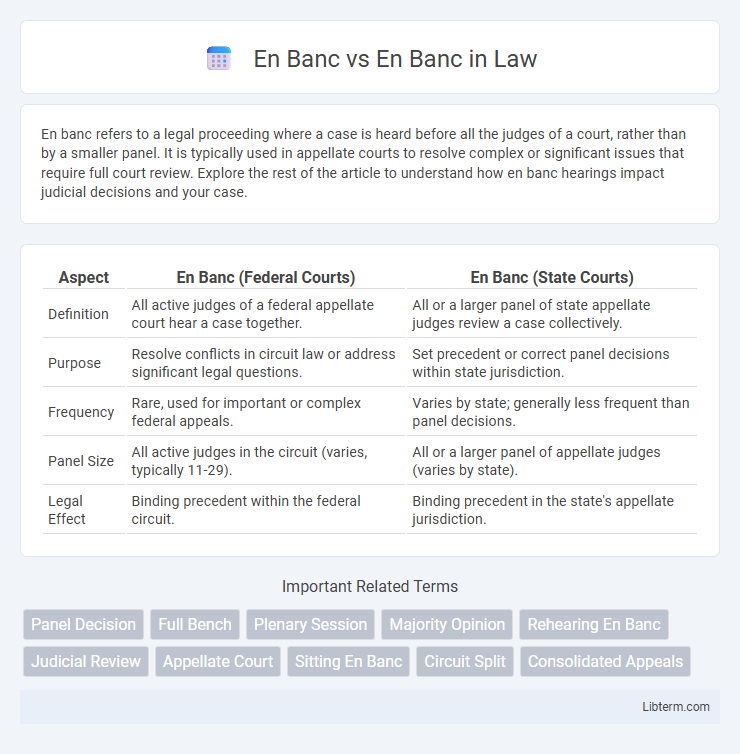En banc refers to a legal proceeding where a case is heard before all the judges of a court, rather than by a smaller panel. It is typically used in appellate courts to resolve complex or significant issues that require full court review. Explore the rest of the article to understand how en banc hearings impact judicial decisions and your case.
Table of Comparison
| Aspect | En Banc (Federal Courts) | En Banc (State Courts) |
|---|---|---|
| Definition | All active judges of a federal appellate court hear a case together. | All or a larger panel of state appellate judges review a case collectively. |
| Purpose | Resolve conflicts in circuit law or address significant legal questions. | Set precedent or correct panel decisions within state jurisdiction. |
| Frequency | Rare, used for important or complex federal appeals. | Varies by state; generally less frequent than panel decisions. |
| Panel Size | All active judges in the circuit (varies, typically 11-29). | All or a larger panel of appellate judges (varies by state). |
| Legal Effect | Binding precedent within the federal circuit. | Binding precedent in the state's appellate jurisdiction. |
Understanding the Term "En Banc
The term "En Banc" refers to a legal proceeding where a case is heard before all the judges of a court rather than by a panel of selected judges, typically in appellate courts. This process ensures a comprehensive review of significant or complex cases, promoting consistent judicial decisions. Understanding "En Banc" is crucial for grasping how courts address important legal questions with full judicial authority.
Historical Origins of En Banc Sessions
En banc sessions originated from French legal traditions, where "en banc" means "on the bench," signifying the full court sitting together rather than a panel of judges. Historically, this procedure was adopted in American appellate courts to ensure uniformity in legal interpretations and resolve cases of exceptional importance. The evolution of en banc hearings reflects the judicial system's emphasis on collective judicial deliberation for critical rulings.
En Banc in Different Legal Systems
En Banc refers to a session where an appellate court hears a case with all judges present rather than a smaller panel. In the United States, En Banc review typically occurs in federal appellate courts, such as the Ninth Circuit, to resolve particularly complex or significant cases. Other legal systems, like some European countries, may not use the term En Banc but apply similar full-court hearings for important judicial decisions to ensure consistency and authoritative rulings.
The Purpose of En Banc Hearings
En banc hearings serve to resolve conflicts within appellate decisions by having all judges of the court participate instead of a smaller panel, ensuring uniformity in legal interpretations. This process addresses particularly complex or significant cases where precedent or broader legal principles are at stake. En banc review provides a mechanism to maintain consistency and clarify court rulings across different panels in the same jurisdiction.
Procedures for En Banc Reviews
Procedures for En Banc reviews involve a larger panel of judges, typically all active judges of an appellate court, reconsidering a case previously decided by a smaller panel. The process requires a formal petition or request, which is subject to strict criteria such as resolving conflicts in precedent or addressing significant legal issues. En Banc reviews promote uniformity in judicial decisions and ensure comprehensive analysis of complex legal questions.
Criteria for Granting En Banc Petitions
En banc review is granted when a case involves questions of exceptional importance or when there is a need to resolve conflicting decisions within the same appellate court. The criteria for granting en banc petitions include ensuring uniformity of the court's decisions and addressing significant legal questions that could impact a large number of cases. Courts reserve en banc hearings for situations where panel decisions may be inconsistent or when clarifying legal standards is necessary to provide clear guidance.
Differences Between Panel and En Banc Decisions
En Banc decisions involve the entire bench of a appellate court, contrasting with panel decisions made by a smaller subset of judges. En Banc reviews are typically reserved for cases of exceptional importance or to resolve inconsistencies in panel rulings. Panel decisions offer quicker resolutions but may lack the authoritative weight of an en banc ruling in establishing legal precedents.
Impact of En Banc Rulings on Legal Precedent
En Banc rulings, where a full panel of appellate judges rehears a case, significantly influence legal precedent by providing authoritative interpretations that override prior panel decisions. These decisions clarify complex legal issues and ensure consistency in the application of law across the jurisdiction, often guiding lower courts and future panels. The impact of En Banc rulings extends beyond individual cases, shaping the evolution of jurisprudence within federal and state appellate courts.
Notable Cases Decided En Banc
Notable cases decided en banc include landmark rulings that significantly impacted federal appellate law, such as United States v. Microsoft Corp., where the full Ninth Circuit reconsidered important antitrust issues. En banc panels typically revisit cases that involve conflicting precedents or substantial questions of law, exemplified by the Supreme Court's rare use of en banc rehearings to address pivotal constitutional matters like Brown v. Board of Education. These decisions, issued by the entire bench rather than a smaller panel, carry enhanced precedential weight within their jurisdictions.
Controversies and Debates Surrounding En Banc Sessions
En banc sessions, where an entire appellate court hears a case rather than a panel, often spark controversies regarding judicial efficiency and consistency. Critics argue en banc hearings consume significant judicial resources and delay final judgments, while proponents highlight their role in resolving conflicting panel decisions and clarifying complex legal issues. Debates also center on strategic use of en banc reviews, with allegations of forum shopping and political motivations influencing decisions in high-profile cases.
En Banc Infographic

 libterm.com
libterm.com